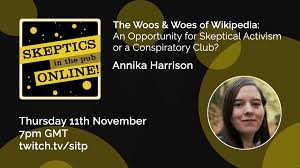"What we don't do is pretend that the work of lunatic charlatans is the equivalent of true scientific discourse. It isn't." - Wikipedia founder Jimmy Wales.
Skeptics in the Pub (either in Greenwich, Camden, or, recently and last night, online) has brought me a lot of joy in recent years. Friendships too - and no little knowledge either. More than that, it has sated and slaked my thirst for curiosity while at the same time opening up whole new worlds of skeptical inquiry to me. Many of which I had not been previously aware of.
So last night's talk, The woos and woes of Wikipedia - An opportunity for Skeptical activism or a conspiratory club (with Annika Harrison), sounded right up my street. I love Wikipedia almost as much as I love Skeptics in the Pub and I visit it far more often. It's been an invaluable aid in planning my TADS and London by Foot walks and it's come in very handy checking details when compiling other blogs.
Not only that, it's a fantastic waste of time. This week alone I've been reading pages about toucans, Porto Alegre, Annette Peacock, impeachment, and sooty mangabeys - and that's barely scratching the surface. So why did I come away from this free Skeptics talk feeling underwhelmed, even a little disappointed?
I can't blame speaker Annika Harrison, she was good, or host Gerard Sorko from the Cologne branch of Skeptics. I think, more than anything, I already knew too much about the subject matter. There was very little in the talk that I was previously unaware of and even the few nuggets of information that were new to me were hardly surprising.
Ultimately, and unlike so many other Skeptics talks, I didn't really learn anything. But I'm still writing about it. A protocol is a protocol (he writes, fully aware that several Skeptics talks never made it into blog form). The questions Annika was asking were:- What is Wikipedia? How does Wikipedia impact the world? Can we trust Wikipedia and can we work with Wikipedia?
We being the nebulous Skeptical community. Wikipedia, as you all know, is an online encyclopaedia that is free to access and is created and modified by its users. It was founded in 2001 by Jimmy Wales and is a not for profit organisation that refuses to carry advertising. The word 'wiki' comes from the Hawaiian word for quick - and if your broadband speed is good enough, Wikipedia certainly lives up to its name.
The dangers of an online encyclopaedia that anyone can contribute to are, of course, fairly obvious. It is open to vandalism, fake news, opinions rather than facts, and subliminal advertising. To mitigate against these misuses, Wikipedia employ a number of different methods to ensure their website is 'an orderly house'.
There are bots that are trained to look for irregularities (pages being deleted and filled with gobbledegook or, in one case, thousands of exclamation marks) and act as stealth cleaners in the battle against online vandalism. There are also talk pages where we can see how each and every page on Wikipedia (a website some consider to be the modern equivalent of the library of Alexandria) came to be.
On these pages, as anyone who has ever been on the Internet will know, it is not uncommon for nuanced, and often heated, debates to take place which in some cases will centre on the use of a single word. An example shown us by Annika was somebody using the phrase "all around the globe" and another person saying that that phrase was puerile and sounds like it belongs in a children's book!
You have to earn your right to edit some pages. Access rights to 'hot topics' stop them becoming something of a battleground. You can probably guess the kind of subject:- homeopathy, vaccinations, Covid, and 5G. All our old favourites.
Some pages can only be edited by certain people and some pages are, for now, frozen. They've been written and that's it. No further editing allowed. All editors are unpaid, they must have (and this rule was famously broken by the current Secretary of State for Transport Grant Shapps - who used a 'sock puppet' to update his own page) no personal connections to the people whose pages they are editing, and include no personal opinions.
They also must not, and this is a weird proviso that could only come in the time of the Internet, have no goal of world domination! Which, I suppose, rules out both Boris Johnson and Pop Will Eat Itself during their Grebo Guru days. Wikipedia claims to be, and all the evidence backs it up, on the side of fostering scientific consensus.
It is, Annika confirms and I have no reason to doubt, our friend. It is on the side of critical, or even Skeptical, thinking and even where it falls down it is attempting to make amends, to be better. One example is how Wikipedia is striving, but currently struggling, to attract more editors from marginalised communities to give those communities more accurate, and fairer, representation.
A Q&A took in cupping and SI units and soon descended into jokes about Malawian taxi drivers and bots from Tuvalu and Fiji (you probably had to be there) and I found it all to be a pleasant, if slightly unenlightening, evening. I guess if I wanted to learn more there is one place I could go. Wikipedia. That page on sooty mangabeys won't read itself.







No comments:
Post a Comment